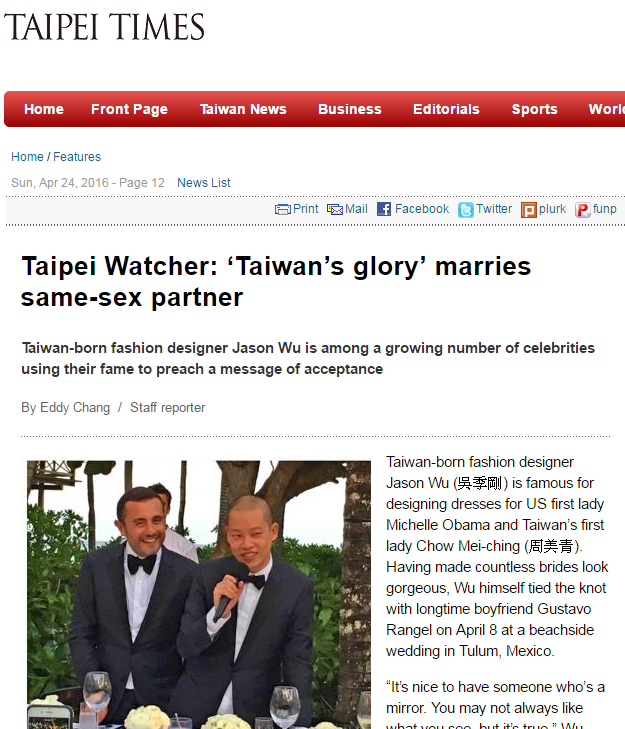Taipei Watcher: ‘Taiwan’s glory’ marries same-sex partner
Taiwan-born fashion designer Jason Wu is among a growing number of celebrities using their fame to preach a message of acceptance
By Eddy Chang / Staff reporter / Source
Taiwan-born fashion designer Jason Wu (吳季剛) is famous for designing dresses for US first lady Michelle Obama and Taiwan’s first lady Chow Mei-ching (周美青). Having made countless brides look gorgeous, Wu himself tied the knot with longtime boyfriend Gustavo Rangel on April 8 at a beachside wedding in Tulum, Mexico.
“It’s nice to have someone who’s a mirror. You may not always like what you see, but it’s true,” Wu said of Rangel to Out magazine in 2012.
After the wedding ceremony, Wu wrote on Instagram that he was grateful to the friends who attended.
“But most of all to my parents and my brother and sister for being the most loving, supportive and special people in my life.”
TOLERANCE BEGINS AT HOME
Wu has said that his mother exerted a profound influence on his life and his desire to become a fashion designer — a point he highlighted after being named International Canadian Designer of the Year at the Canadian Arts and Fashion Awards last week.
“My mother bought me my first sewing machine when I was 10 after we immigrated to Canada — I never looked back,” Wu wrote on Instagram.
In response to her son’s wedding, Jennifer Chen (陳美雲) told the media that he came out over a decade ago.
“All I ask for my son is to work hard. His life should be decided by himself, and I totally respect all his decisions,” Chen said, adding that the Wu family has kept a low profile over concerns that the local media may publish negative reports because same-sex marriage remains controversial in Taiwan.
Wu said he dressed-up Barbie dolls when he was younger and, at the age of five, told his parents that he wanted to be a fashion designer and open his own bridal shop. Most parents at the time would probably have expressed concerns, but Wu’s parents took it in stride.
“Asian parents would not let you have that kind of thing, [but] my mom was really cool like that,” Wu said. His early love for dolls led to the launch in 2014 of his own line of fashion dolls with luxury designer fashion store Montaigne Market.
When asked how his father felt about his Barbie dolls, of which he had 150 as of 2013, Wu said that his dad would buy him dolls, too.
“It was so against everything he believes and understands, but he did it anyway,” Wu said. “My parents love me.”
ROLE MODEL
Wu is among a growing number of celebrities in Taiwan — A-mei (張惠妹) and Jolin Tsai (蔡依林) are just a few — who are using their celebrity to preach a message of tolerance and acceptance.
During a visit to Taiwan in 2010, Wu said that he was proud to be Taiwanese and was glad to represent the success of Taiwan on the international stage (dubbed “the glory of Taiwan,” 台灣之光).
“I hope my coming back can be an example to people in Taiwan that design can be a very valuable career,” Wu said.
Chien Tsu-chieh (簡至潔), secretary-general of the Taiwan Alliance to Promote Civil Partnership Rights (伴侶盟), told the media that since the US Supreme Court legalized same-sex marriage in June last year, several states have attempted to deny American citizens this right. But a growing chorus of celebrities and companies are boycotting those states to show support for the lesbian, gay, bisexual and transgender (LGBT) community, and Wu’s wedding sets a good example for Taiwanese, Chien said.
Some teachers even use Wu’s story as a reference for gender equality education, teaching their students to respect people with different gender characteristics or sexual orientation.
Taiwan is relatively friendly to the LGBT community, but discrimination against homosexuals continues to exist. For example, the Alliance of Taiwan Religious Groups for the Protection of Family (護家盟) has protested LGBT rights.
Take the recent kerfuffle over a McDonald’s Taiwan commercial for McCafe that depicted a father’s acceptance of his gay son (www.youtube.com/watch?v=4CfgO56C0I8). The alliance called on parents to boycott the fast food giant, attacking the ad for encouraging Taiwanese youth to be gay.
But why can’t LGBT people be who they really are? Isn’t a happy family one in which parents accept their children unconditionally? There is much we can learn from Wu, the “glory of Taiwan,” and his loving, supportive family.
發佈日期: 2016/04/24


轉
推
+1
寄